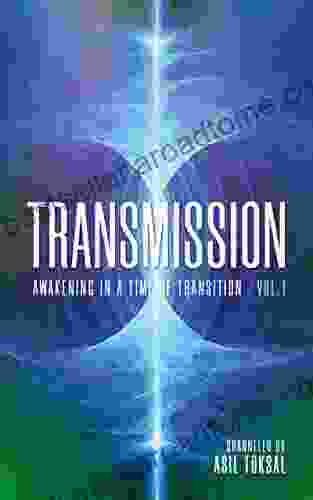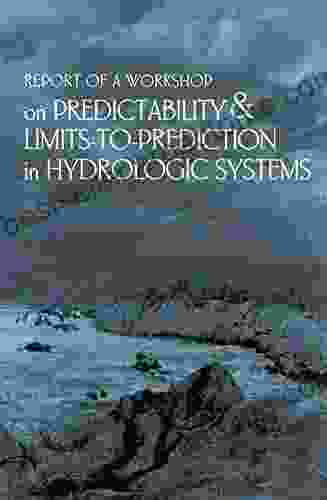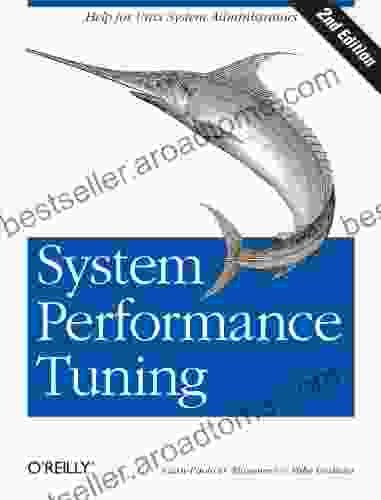Report of Workshop on Predictability and Limits to Prediction in Hydrologic

This workshop was held in response to the growing need for better predictions of hydrologic systems. As the world's population and economy continue to grow, so too does the demand for water resources. At the same time, climate change is making hydrologic systems more unpredictable. This combination of factors is putting a strain on water resources and making it difficult to plan for the future.
4.7 out of 5
| Language | : | English |
| File size | : | 1352 KB |
| Text-to-Speech | : | Enabled |
| Screen Reader | : | Supported |
| Enhanced typesetting | : | Enabled |
| Word Wise | : | Enabled |
| Print length | : | 128 pages |
The goal of this workshop was to bring together experts from a variety of disciplines to discuss the current state of the art in predictability and limits to prediction in hydrologic systems. The workshop participants included hydrologists, climate scientists, statisticians, and economists. The workshop was organized into four sessions:
- Predictability of hydrologic systems
- Limits to prediction in hydrologic systems
- Implications of predictability and limits to prediction for water resources management
- Research needs
Predictability of Hydrologic Systems
The first session of the workshop focused on the predictability of hydrologic systems. The participants discussed the different factors that affect predictability, including the physical characteristics of the system, the availability of data, and the models used to make predictions.
The participants concluded that hydrologic systems are inherently unpredictable. This is because they are complex systems that are influenced by a variety of factors, many of which are beyond our control. However, the participants also concluded that it is possible to make useful predictions of hydrologic systems, provided that we understand the limits to predictability.
Limits to Prediction in Hydrologic Systems
The second session of the workshop focused on the limits to prediction in hydrologic systems. The participants discussed the different sources of uncertainty in hydrologic predictions, including uncertainty in the input data, uncertainty in the models, and uncertainty in the future climate. The participants discussed the impact of uncertainty on consumers of hydrologic information, and the importance of communicating uncertainty to decision-makers.
The participants concluded that it is impossible to make perfect predictions of hydrologic systems. This is because there are always some sources of uncertainty that cannot be eliminated. However, the participants also concluded that it is possible to make useful and reliable predictions, provided that decision-makers are aware of the uncertainties involved.
Implications of Predictability and Limits to Prediction for Water Resources Management
The third session of the workshop focused on the implications of predictability and limits to prediction for water resources management. The participants discussed the different ways that predictability and limits to prediction can affect water resources management decisions. The participants discussed the importance of considering uncertainty when making water resources management decisions, and the importance of communicating uncertainty to stakeholders.
The participants concluded that predictability and limits to prediction have a significant impact on water resources management. Decision-makers need to be aware of the uncertainties involved in hydrologic predictions, and they need to consider these uncertainties when making decisions. The participants also concluded that it is important to communicate uncertainty to stakeholders, so that they can make informed decisions about water resources management.
Research Needs
The fourth session of the workshop focused on research needs. The participants discussed the different areas where more research is needed to improve the predictability of hydrologic systems and to reduce the limits to prediction. The participants discussed the need for research on new data collection methods, new models, and new methods for communicating uncertainty.
The participants concluded that there is a need for more research on predictability and limits to prediction in hydrologic systems. This research will help us to improve the accuracy and reliability of hydrologic predictions, and it will help us to make better decisions about water resources management.
This workshop brought together experts from a variety of disciplines to discuss the current state of the art in predictability and limits to prediction in hydrologic systems. The participants concluded that hydrologic systems are inherently unpredictable, but that it is possible to make useful predictions, provided that we understand the limits to predictability. The participants also concluded that predictability and limits to prediction have a significant impact on water resources management decisions, and that decision-makers need to be aware of the uncertainties involved in hydrologic predictions.
The workshop participants identified a number of research needs, including the need for research on new data collection methods, new models, and new methods for communicating uncertainty. This research will help us to improve the predictability of hydrologic systems and to reduce the limits to prediction. It will also help us to make better decisions about water resources management.
4.7 out of 5
| Language | : | English |
| File size | : | 1352 KB |
| Text-to-Speech | : | Enabled |
| Screen Reader | : | Supported |
| Enhanced typesetting | : | Enabled |
| Word Wise | : | Enabled |
| Print length | : | 128 pages |
Do you want to contribute by writing guest posts on this blog?
Please contact us and send us a resume of previous articles that you have written.
 Book
Book Novel
Novel Page
Page Chapter
Chapter Text
Text Story
Story Genre
Genre Reader
Reader Library
Library Paperback
Paperback E-book
E-book Magazine
Magazine Newspaper
Newspaper Paragraph
Paragraph Sentence
Sentence Bookmark
Bookmark Shelf
Shelf Glossary
Glossary Bibliography
Bibliography Foreword
Foreword Preface
Preface Synopsis
Synopsis Annotation
Annotation Footnote
Footnote Manuscript
Manuscript Scroll
Scroll Codex
Codex Tome
Tome Bestseller
Bestseller Classics
Classics Library card
Library card Narrative
Narrative Biography
Biography Autobiography
Autobiography Memoir
Memoir Reference
Reference Encyclopedia
Encyclopedia Ashley Baynton Williams
Ashley Baynton Williams Arved Ashby
Arved Ashby Gary Stokes
Gary Stokes Diana Cooper
Diana Cooper Annie Auerbach
Annie Auerbach Crystal Zaborowski Saltrelli
Crystal Zaborowski Saltrelli April Crawford
April Crawford Anne Darling
Anne Darling Melissa Help
Melissa Help Anna Funder
Anna Funder Lincoln Geraghty
Lincoln Geraghty Neil R A Bell
Neil R A Bell Anna Badkhen
Anna Badkhen Anthony Quinata
Anthony Quinata Anne Marie Albano
Anne Marie Albano Arnold Marsden
Arnold Marsden Jason T Eberl
Jason T Eberl Arianna Huffington
Arianna Huffington Anthony Griffith
Anthony Griffith Ian Johnson
Ian Johnson
Light bulbAdvertise smarter! Our strategic ad space ensures maximum exposure. Reserve your spot today!
 Caleb CarterFollow ·17.9k
Caleb CarterFollow ·17.9k Felix CarterFollow ·13.9k
Felix CarterFollow ·13.9k Edison MitchellFollow ·6.2k
Edison MitchellFollow ·6.2k Eddie PowellFollow ·13.2k
Eddie PowellFollow ·13.2k Isaias BlairFollow ·13.7k
Isaias BlairFollow ·13.7k Albert CamusFollow ·10.5k
Albert CamusFollow ·10.5k Gage HayesFollow ·7.3k
Gage HayesFollow ·7.3k Garrett BellFollow ·19k
Garrett BellFollow ·19k

 Jeremy Cook
Jeremy CookDrawing and Illustrations of the 18th Century: A Journey...
Step into the...

 Easton Powell
Easton PowellPhysician Experience With Obstructive Sleep Apnea: The...
Obstructive sleep apnea (OSA) is a common...

 Cruz Simmons
Cruz SimmonsUnlock Your Inner Healer: The Transformative Power of...
Are you ready to embark on a profound healing...

 Paulo Coelho
Paulo CoelhoTransmission Awakening In Time Of Transition Vol. 1: A...
Transmission Awakening...
4.7 out of 5
| Language | : | English |
| File size | : | 1352 KB |
| Text-to-Speech | : | Enabled |
| Screen Reader | : | Supported |
| Enhanced typesetting | : | Enabled |
| Word Wise | : | Enabled |
| Print length | : | 128 pages |
















